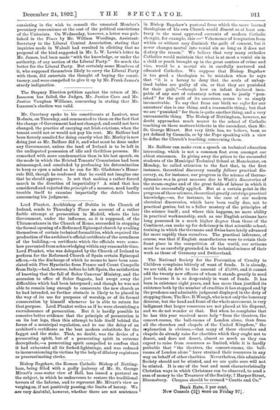Bishop Bagshaw, the Roman Catholic Bishop of Notting- ham, being
filled with a godly jealousy of Mr. St. George Mivart's rose-water view of Hell, has issued a pastoral on the subject, in which he endeavours to restore the traditional -terrors of the Inferno, and to represent Mr. Mivart's view as verging on, if not positively passing, the limits of heresy. We are very doubtful, however, whether there are not sentences
in Bishop Bagshaw's pastoral from which the more learned theologians of his own Church would dissent as at least con- trary to the most approved currents of modern Catholic thought, for example, this :—" Vehemence of temptation from within or without may diminish the guilt of consent, but it never changes mortal into venial sin so long as it does not destroy the reason." We believe that very many orthodox Catholics would maintain that what is at most a venial sin in a child or youth brought up in the great centres of crime and vice, would be a mortal sin in carefully nurtured and educated Catholics. We suppose that Bishop Bagshaw is too good a theologian to be mistaken when he says that 'it is a heresy to deny that the souls of unbap- tised babies are guilty of sin, or that they are punished for their guilt,"—though how an infant declared inca- pable of any sort of voluntary action can be justly "pun- ished" for the guilt of its ancestors, seems to us simply inconceivable. To say that from our birth we suffer for our ancestors' sins is one thing, and a reasonable thing; but that we are "punished" for them is quite another thing, and a very unreasonable thing. The Bishop of Nottingham, however, no doubt approaches much nearer to the school of Catholic teaching on these matters hitherto in the ascendant, than Mr. St. George Mivart. But very little has, we believe, been as yet defined by Councils, or by the Pope speaking with a view to define the Church's teaching, concerning them.


































 Previous page
Previous page